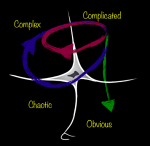I have been thinking a lot about how a monitoring framework could look like that takes into account the quirks of a complex system. One of the central things, I believe, is that we need to find alternatives to measuring only where we believe that change will happen towards an approach to gather data more broadly.
Continue reading
Tag Archives: complex systems
Of Complexity and Chaos

The Cynefin Framework with the newly renamed ‘Obvious’ domain (formerly ‘Simple’). Source: Cognitive Edge
In the Cynefin framework, complex and chaotic are two separate domains. Complexity is defined as the domain where agents and constraints co-evolve, chaos as where there are no constraints. Both are part of the unordered side of Cynefin, i.e. where events are unpredictable and expert knowledge and analysis are not leading to better decisions. Chaos is seen as a domain where you don’t really want to be, so all you have to do there is go act quickly and decisively to get out. To use Dave Snowden’s words: “Chaos is a transitionary domain. (…) If you collapse into it without [intention] then the strategy is to move out in a controlled way; you will move out as constraints happen naturally. Entered deliberately it can create the conditions for radical innovation, used as contained chaos it allows for distributed cognition or Wisdom of Crowds. Nothing resides in Chaos for any period without sustained effort.” Continue reading
Refreshing read on regularities in complex systems
I just came across this blog post by Cynthia Kurtz, who wrote with Dave Snowden the paper “The new dynamics of Strategy: Sense-making in a complex and complicated world“. Cynthia describes in her post how she perceives regularities in complex systems, so called oscillations.
I like the post because it uses a really refreshingly simple and jargon-less language to talk about this characteristic of complex systems. Compared with other texts on complex systems, it’s fun reading and seeing oscillation and, connected to it, unpredictability in complex systems with different eyes.
Here an example:
Those leaves remind me of a conversation I had once with a person with whom I was discussing the differences between complicated and complex patterns. He said something like, “You say a complicated pattern repeats and a complex one doesn’t, right? But how do you explain the fact that complex patterns sometimes do repeat?” I said, “They repeat until they don’t.” What I meant was, when a leaf is oscillating, it looks like it’s connected to some perfectly engineered device governed by a mechanical timer. But that’s an illusion that bursts when the leaf suddenly stops. Complicated patterns repeat because somebody or something made them repeat. They stop repeating when somebody or something stops them repeating, or when they break down and need to be fixed (after which they repeat again, if somebody or something makes them). Complex patterns repeat because they started repeating, and they stop repeating because they’ve stopped repeating. Keep in mind, of course, that the patterns we see in our world are rarely purely complex or complicated. Even those oscillating leaves I see out of my window have been influenced by the complicated design of the house that separates us.
Is this the dilemma of complexity in development?
I have not been around for a while, so my blog has remained dormant. But I have not abandoned it! I will try to keep posting more often again.
This post is about a paragraph of a book that I have started reading recently. The book is called ‘Harnessing Complexity’ and the authors are Robert Axelrod and Michael D. Cohen. The paragraph says:
Analyzing complex systems within [our] framework does not assure the ability to produce specific outcomes but can foster an increase in the value of populations over time.
This statement made me thinking if this is actually the dilemma we face when we want to apply principles of complexity sciences to development – or other real-world cases, for that matter. In development, we need to specify outcomes we want to achieve within a given time frame and we need to build a system that enables us to measure and report about the achievement of these outcomes. Now if the use of frameworks informed by complexity sciences does not target the achievement of specific outcomes but more generally the increase in the value of populations over time (in the case of development that would be what we call ‘well-being’), than it will be hard to sell these projects to donors. We cannot go there and tell them ‘Our goal is to make the world a better place but we don’t have any specific outcomes nor a clear time frame to achieve that goal.’
I do not really have an answer to that dilemma right now. Any thoughts out there?
